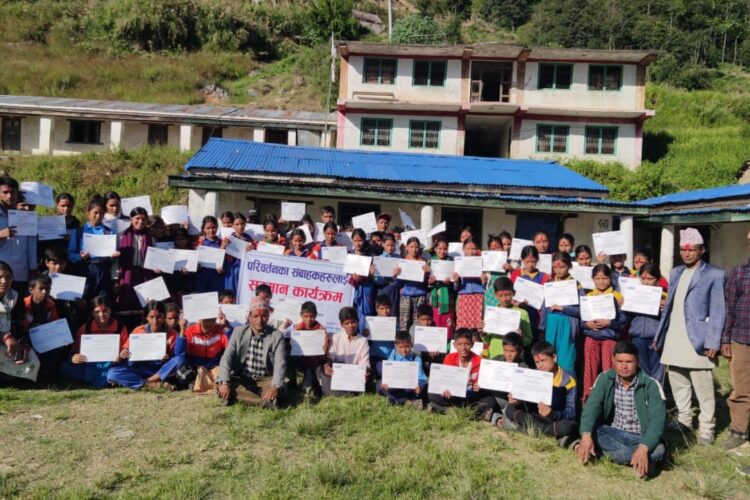Girls Get Equal Preventing Child, Early and Forced Marriage (PCEFM-NORAD)Project/Plan International Nepal : 2020-24

| Location: Kalikot (Sanni Tribeni RM, Raskot M.and Naraharinath RM) | ||
| Grant by/Donors: Plan International Nepal | ||
| Value of contract NRs: 3,50,52,855 | Beneficiaries: 8200(Child and adolescent girls and young Women | |
| Name of Associated Partners: None | Employment/Service Staffs: 7 | |
| Project Duration: 4 years and 3 months | Start Date: July 2020 | Completion Date: November 2024 |
| Narrative Description of Project: | ||
| Objectives of the Project: The objective of the project is to prevent child, early and forced marriage. | ||
| Major Achievement: Strong coordination and collaboration with local governmentAdolescents, young, families and community people are being sensitized on harmful social norms through interaction program, meeting, dialogue and training and the cases of menstruation mal practice, discrimination between son and daughter (caretaking, fooding, education etc.) are decreasing.Adolescent girls and young women are conscious about MHM after dissemination the information on good MHM practices through interaction meeting/trainings and SBCC materials. (use of sanitary pad increased and school absent decreased during menstrual period)Enhanced knowledge of girls, adolescents and young women on SRHR. Hence, the positive sign is appearing in our program area i.e. adolescent’s girls are demanding stigma-free SRHR services without hesitation. (After training to health service providers on stigma-free SRHR, adolescents friendly and gender responsive, CSE training to school’s teacher, advocacy capacity building training to adolescents on stigma-free SRHR)high vulnerable adolescents’ girls who were at the high risk of child marriage were got counseling and linked into women cooperatives for their economic development and better future (650 Nos.).vulnerable adolescent’s girls have got loan from cooperatives for income generation activities. (50 Nos.)3850 adolescents received information on SRHR through our project activities and intervention (Female-715, Male- 550, Disability-91, Dalit- 297)Teachers taking additional class on CSE/SRHR after 78 Educational staffs/teachers trained on CSE/SRHR from all three project Palikas.Developed 3 Model CoC centers with technology at working palikas (one in each palika)Interaction Workshop with Journalist (2 events) in Manma so that they disseminating the information on CEFM, SRHR and other harmful social norms.Running the CoC classes through 10 CoC centers comprising all program palikas.CoC participants were excited to join peer to peer education and organize extracurricular activities in their school as well as community.CSE/SRHS was provided to cooperatives members and they have started awareness session on CSE/SRHR to their cooperatives members in their palikas.After onsite coaching training, group management training, account training, logistic support and cooperative management training, they are capacitating to run their cooperative smoothly.Provided skill level training and technology support to adolescent and now they have started their own business.586 girls and boys received support to develop and implement action plans and economic empowerment training on gender equality, child rights and CEFM.Media mobilization for raising awareness against the discriminatory and harmful social norms and values. | ||